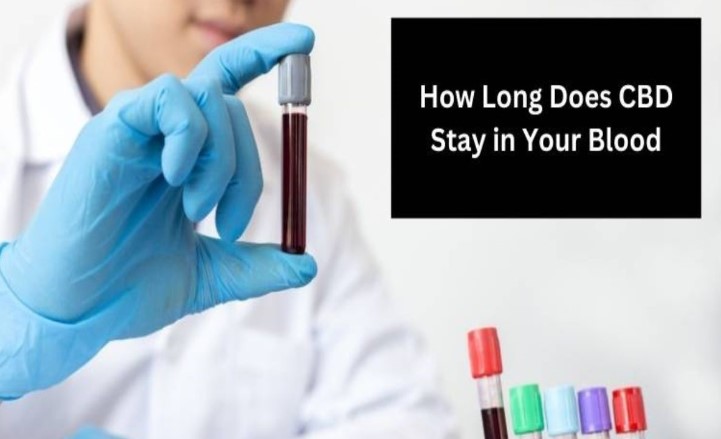- Like
- SHARE
- Digg
- Del
- Tumblr
- VKontakte
- Flattr
- Buffer
- Love This
- Save
- Odnoklassniki
- Meneame
- Blogger
- Amazon
- Yahoo Mail
- Gmail
- AOL
- Newsvine
- HackerNews
- Evernote
- MySpace
- Mail.ru
- Viadeo
- Line
- Comments
- Yummly
- SMS
- Viber
- Telegram
- JOIN
- Skype
- Facebook Messenger
- Kakao
- LiveJournal
- Yammer
- Edgar
- Fintel
- Mix
- Instapaper
- Copy Link
Introduction
Curious about CBD’s stay in your bloodstream? “How long does CBD stay in your blood?” is a common question, and the answer hinges on various factors. Dosage, frequency, metabolism, and product type all influence its duration in your system. Generally, CBD’s effects can last from a few hours to a few days.
However, it’s important to note that traces of CBD might still be detectable in drug tests. In this concise guide, we’ll unravel the intricacies of CBD absorption and metabolism, providing you with a clearer understanding of its presence in your blood. Stay informed and make confident choices for your well-being.
Understanding CBD Metabolism
Understanding CBD metabolism is crucial for grasping how this popular compound interacts with the human body. Once ingested, CBD embarks on a complex journey through the digestive system and liver.
Here, enzymes work to break down the compound into its metabolites, which are then distributed throughout the body via the bloodstream. Interestingly, CBD’s metabolism can vary from person to person due to factors such as genetics, dosage, and method of consumption.
The liver’s role in this process is especially noteworthy, as it contains a group of enzymes known as cytochrome P450, responsible for metabolizing a wide array of substances, including CBD.
This interplay between CBD and the body’s metabolic pathways sheds light on how individual responses to CBD can differ, impacting factors like onset time, duration of effects, and overall efficacy. Moreover, understanding CBD metabolism provides valuable insights for optimizing dosage and delivery methods to maximize its therapeutic potential.
Factors Influencing CBD Duration in the Body
The duration CBD remains in the bloodstream can vary widely among individuals. Several key factors influence this:
1. Dosage and Frequency of Use
The amount of CBD consumed and how often it is taken significantly impacts its presence in the blood stream. Higher doses and frequent usage may lead to an extended period of detection.
2. Method of Consumption 3
Different consumption methods affect the speed of absorption and, consequently, the duration of CBD in the blood stream. Inhalation results in rapid absorption, while edibles necessitate digestion, slowing the process.
3. Individual Metabolism
Each person’s metabolic rate is unique. Fast metabolizers process substances more quickly, leading to a shorter presence of CBD in the blood.
4. Body Composition
Factors such as body fat percentage and overall health can influence CBD metabolism. Those with higher body fat percentages may retain CBD longer due to its fat-solubility.
5. Quality and Purity of CBD Product
The potency and purity of the CBD product play a role in how it is metabolized. Higher-quality products may have a more consistent and predictable duration of presence in the bloodstream.
6. Interaction with Other Substances
CBD may interact with other medications, potentially affecting its metabolism. Always consult a healthcare professional before combining CBD with other substances.
How Long Does CBD Stay in Your Blood Stream?
1. CBD in the bloodstream after consumption
After consumption, Medicated CBD enters the bloodstream through various methods such as ingestion, inhalation, or topical application. The onset time can vary depending on the method used, with inhalation providing the quickest absorption, followed by sublingual ingestion, and then oral ingestion which takes longer to take effect. Once in the blood stream, CBD is transported throughout the body, interacting with the endocannabinoid system and other receptors to produce its effects.
2. Peak levels and duration of effects
The peak levels of CBD in the blood stream typically occur within 1-2 hours after consumption, but this can vary based on factors like dosage, individual metabolism, and the form of CBD product used. The duration of effects varies as well, with some people experiencing relief for several hours, while others may require more frequent dosing. It’s important to note that the effects of CBD may also be influenced by the presence of other compounds in full-spectrum or broad-spectrum products.
3. Variations between different CBD products (syrup vs. oil)
Different CBD products can exhibit variations in absorption and metabolism. For example, CBD syrups may be absorbed more rapidly due to their liquid form, while CBD oils may have a slower absorption rate. Additionally, factors like the presence of carrier oils, additional ingredients, and the concentration of CBD can impact how quickly and efficiently the body processes the compound. Understanding these variations can help individuals choose the most suitable CBD product for their specific needs and preferences.
How long does CBD stay in your system blood test?
The duration that CBD stays in your system and is detectable in a blood test can vary depending on several factors.
Generally, CBD can be detected in the bloodstream for up to 2-5 days after a single use. However, for regular users or those taking high doses, it may be detectable for a longer period, potentially up to a week or more.
It’s important to note that this is a rough estimate and individual factors like metabolism, frequency of use, dosage, and the sensitivity of the testing method can all influence how long CBD remains detectable in your system through a blood test.
Duration of CBD Effects vs. Presence in Blood
- Clarification of the difference between how long CBD affects the body and how long it stays in the bloodstream.
It’s important to distinguish between the duration of CBD effects and the time it remains in the bloodstream. The duration of effects refers to how long an individual experiences the therapeutic benefits or relief from CBD after consumption. This can vary based on factors like dosage, method of consumption, individual physiology, and the specific ailment being addressed. On the other hand, the presence of CBD in the bloodstream refers to the measurable amount of CBD that can be detected in blood tests. This measurement does not necessarily correlate with the ongoing therapeutic effects of CBD.
- Practical examples or scenarios to illustrate this concept.
Consider a scenario where an individual consumes a CBD-infused edible. The effects may start to be noticeable after 30 minutes to 2 hours, with peak effectiveness occurring at around 2-4 hours. These effects may last anywhere from 4 to 8 hours, providing relief from symptoms like pain or anxiety. However, even after the effects have subsided, traces of CBD may still be detectable in the bloodstream for up to several days, depending on factors such as dosage, frequency of use, and individual metabolism.
To further illustrate, let’s imagine a person who uses a CBD topical for localized pain relief. The effects are typically felt within minutes to an hour after application and may last for several hours. However, the presence of CBD in the bloodstream in this scenario is minimal, as topicals are designed to interact with cannabinoid receptors in the skin without entering the systemic circulation to a significant degree.
Understanding this distinction is vital for individuals seeking to manage their CBD consumption effectively, ensuring they are attaining the desired therapeutic effects without overestimating the duration of its presence in their bloodstream.
FAQs
1. How long does CBD stay in your bloodstream?
CBD typically stays in your system for about 2-5 days after a single use. However, for regular users or those taking higher doses, it might be detectable for up to a week or more. It’s important to remember that individual factors like metabolism, frequency of use, and dosage can influence this timeframe.
2. How long do CBD gummies stay in your blood?
CBD gummies follow a similar pattern to other CBD products. Generally, they can be detected in your system for approximately 2-5 days after ingestion. For those who use them regularly or in higher doses, it may be traceable for a longer period, potentially up to a week or more.
3. How long does 100 mg of CBD stay in your system?
The amount of CBD you take also plays a role. In the case of a 100 mg dose, it’s important to note that higher doses may extend the detectable window. On average, even a dose of this size is typically cleared from your system within about 2-5 days. However, individual factors like metabolism and frequency of use can influence this duration.
Conclusion
Understanding how long CBD stays in your blood is a complex endeavor, as it is influenced by a myriad of individual factors. While general estimations exist, the specifics can vary widely. For those concerned about drug tests, it is crucial to choose high-quality CBD products and consult with a healthcare professional.
As the realm of CBD research continues to expand, more precise information regarding its metabolism and longevity in the body will likely emerge. In the meantime, being informed about the factors influencing CBD’s duration can help individuals make informed decisions about their CBD use. Always remember to consult with a healthcare professional for personalized advice.


